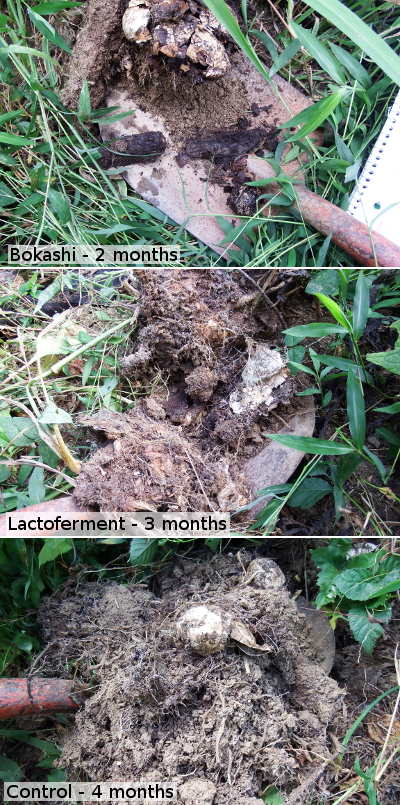
Bokashi conclusions
 I'm finally ready to pass judgment on this year's bokashi experiment.
To recap, bokashi is a method of pre-decaying food scraps in an
airtight container with the help of a microbial starter before applying
that proto-compost to the soil. I tried three different versions this
spring --- bokashi using a storebought starter, bokashi using a homemade (lactofermented) starter, and a control bucket with no starter.
I'm finally ready to pass judgment on this year's bokashi experiment.
To recap, bokashi is a method of pre-decaying food scraps in an
airtight container with the help of a microbial starter before applying
that proto-compost to the soil. I tried three different versions this
spring --- bokashi using a storebought starter, bokashi using a homemade (lactofermented) starter, and a control bucket with no starter.
It takes us about a month
for us to fill a five-gallon bucket with food scraps during the
non-preserving season. So I had to space my experiments out, applying
the control to poor pasture soil March 17, digging in the lactofermented
scraps on May 8, and the traditional bokashi on June 6. The photos to
the left show that digging up those three patches in the middle of
August resulted in a time-lapse image of decomposition, suggesting that
neither type of bokashi sped up decomposition much, if at all.
Would I recommend bokashi to anyone? Well, the air-tight buckets
were a nice way to consolidate lots of foods scraps, and the bokashi
starter did cut down on bad odors when opening the bucket...although the
starter became much less effective once the true heat of summer hit.
But I don't feel like the method is really worth the expense unless you
live in an air-conditioned apartment and have to hoard your scraps for a
long time before use. Instead, our food scraps have been hitting the
outside compost pile this summer, where I think we'll get just as much
fertility with much less work (and no outlay of cash). It looks like
bokashi isn't for us.
Want more in-depth information? Browse through our books.
Or explore more posts by date or by subject.
About us: Anna Hess and Mark Hamilton spent over a decade living self-sufficiently in the mountains of Virginia before moving north to start over from scratch in the foothills of Ohio. They've experimented with permaculture, no-till gardening, trailersteading, home-based microbusinesses and much more, writing about their adventures in both blogs and books.
Want to be notified when new comments are posted on this page? Click on the RSS button after you add a comment to subscribe to the comment feed, or simply check the box beside "email replies to me" while writing your comment.
